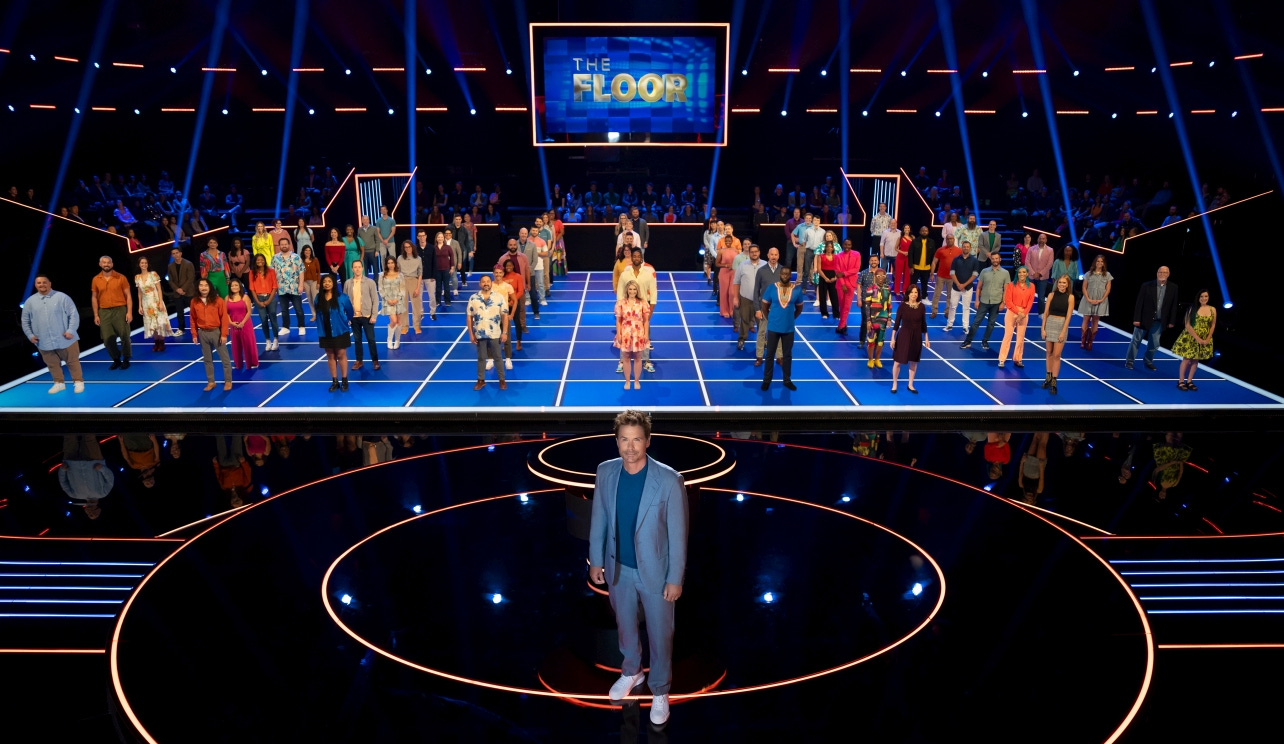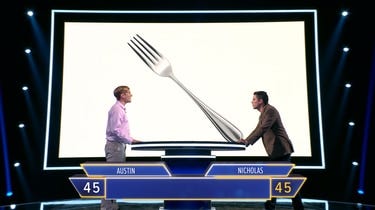Consider The Floor
The case for the lowest common denominator show as the ultimate comfort watch.
Consider The Floor
When you hear the words “comfort watch,” a bevy of Mike Schur sitcoms and 2000s teen soaps undoubtedly flash across the IMAX of your mind. Because honestly, who among us hasn’t turned to the Thanksgiving episodes of Gilmore Girls during a psychological crisis? The comfort watch category is a unique slice of our taste that, while still curated, offers a window into who we are when the metaphorical cameras aren’t rolling. Of course, we all loved the Uncut Gems episode of Industry, but when the chips are down, we semi-ironically curl up to season three of The Hills, an offshoot of our high-low brand that deepens our relatability factor, like when a celebrity cites McDonald’s as their go-to hangover food during 73 Questions with Vogue.
As the premier purveyor of Philistinian drivel, I’m here to educate you on my personal, totally non-ironic smooth brain watch, The Floor, a FOX game show hosted by certified DILF Rob Lowe. It is the quintessential lowest common denominator show, something that might play in a retirement home or a podiatrist’s waiting room, and I look forward to every episode like it's the Super Bowl. The second season begins today, September 25th.
The premise is that 200 average Americans enter a giant floor where they’re each given their own floor tile and a corresponding “area of expertise.” But don’t fret: “expertise” is a term looser than Kris Jenner that time she took an edible at a Mexican restaurant. No PhD or credibility is required; it’s more so a topic you like a lot, and can range from dogs to nepo babies to things you find in a bathroom.
When the game begins, a contestant is randomly selected and must choose one of the players on the tiles that neighbor their own to challenge, based on whichever topic they feel most confident in. The two leave the floor and enter the main stage, where they engage in some light banter with Rob, where he’ll be like, “Tell me, peasants, how would you spend this life-changing $250,000 prize? I hear that is a lot of money for paupers like you.” Then, the duel begins. Each player has a stop-clock set at 60 seconds, and the pair alternates back and forth, identifying images pertaining to the chosen topic that flash on the screen above them. So, for example, if the topic was kitchen accessories, sterile Getty images of whisks, blenders, and martini glasses would appear.
When a contestant answers correctly, their time stops. There’s no direct penalty for a wrong answer, but if an image is skipped, three seconds are deducted from their time. The person who runs their clock down first loses, and the winner absorbs the losers’ territory and remains in control of the board. They then make a choice: continue to play in the hopes of accruing more territory and winning the daily $20,000 prize awarded to the contestant with the most tiles at the end of the night, or return to the safety of the floor, where they’ll need to wait until they’re challenged. This is where the very rudimentary strategy comes into play: do you play an aggressive, short-term game with the goal of securing $20K since the odds of winning the grand prize are so poor, or do you keep as low of a profile as possible, hoping you slide your way into the final duel through the power of attrition?
Another piece of the puzzle to consider: if the player who is challenged in their own category wins a duel, they then inherit the category of their eliminated opponent. Which means you could get stuck with something like Russian Oligarchs and have to defend it. In that case, your best bet is to hope you can get to the end of the episode without competing again so that you can go back to your hotel room and memorize the facial differences between Viktor Vekselberg and Arkady Rotenberg.
Rules and logistics aside, what the show really boils down to is performance under pressure, which is what makes it compelling. In the first season, one contestant freezes and can’t remember what nails are called (the ones that get hammered, not the ones with French tips). In another episode, a middle-aged man with the typical alpha confidence that no one will be able to challenge his passion for space is swiftly dethroned by a gratingly bubbly cowgirl when he falters on total layups, like Pluto and Neptune. There’s something cathartic about watching egos get humbled and underdogs prevail in such pretenseless terms. There’s no nuance, it’s just, “Sorry, buddy. You forgot Shailene Woodley’s name tonight. There’s the door.”
As an audience member at home, you get to feel like Einstein on Adderall. I’m screaming at my TV, “Ladle! Ladle!” then chuckling derisively along with Rob when the dodo on screen calls it a “soup server.” It’s refreshing to feel unchallenged, the same low-hanging fruit morale boost as the NYT’s Connections game. Over time, the Sim-like players, idling on their tiles in the fuschia jumpsuit or floral blazer that they’re forced to wear for a week straight, seem to form genuine friendships with their neighbors. It’s upbeat, but never treacly.
ATEOTD, we all enjoy feeling smarter than we are. We can all name limitless brunch foods. We would all fuck Rob Lowe. So I can’t help but wonder. . .in this fractured nation, is The Floor the cure?
Watching: The Circle S7 — I took a break from this show for a while but the new season is really good!
Buying: EatPastry Edible Cookie Dough
Reading: “She Delivered the Kardashian and Bieber Babies How Dr. A became the most beloved OB/GYN in Hollywood.” (The Cut)








lol not gonna contest The Floor as the LCD show. but where does Family Feud come into play?? somehow Family Feud ALWAYS comes on when it's say, raining at the beach. or after a hellacious day at work. i don't even have to try, the universe delivers it to my screen.